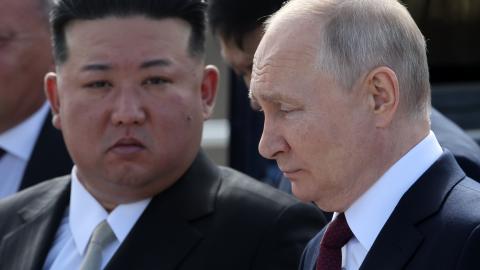Why is Pyongyang ringing in the new year with warmongering?
North Korea’s official newspaper, Rodong Sinmun, is predicting a year of living dangerously, marked by the “highest risk of confrontation.” Addressing an end-of-year party plenum, Kim Jong Un cautioned that “war can break out at any time.” He added, however, that foreign military confrontation would be met by “a deadly blow to thoroughly annihilate” the enemy and subjugate “the whole territory of South Korea.”
Kim’s dire forecast is a matter of concern, but not because deterrence is likely to fail. The North Korean leader wants others to fear the prospect of war, which is why he (once again) threatened that the Korean peninsula is “on the precipice of nuclear war.” But Kim wants to sharpen his “treasured sword,” not fall on it.
North Korea may be viewed as preternaturally bellicose, but menacing discourse is not harmless prattle. The sharp rhetoric emanating from the Kim regime masks serious internal and external goals that impinge on vital U.S. national interests and regional security.
For starters, Kim needs to justify his fixation on military spending. Clearly, three military parades, 44 missiles, and 64 flights a year are difficult to sustain. The notion that U.S. and allied military exercises are making the thought of war on the peninsula “realistic” is propaganda. Even so, Kim’s pledge to launch three more military spy satellites in the coming months is realistic, if also suggestive of one of the concrete benefits of adopting Russia as North Korea’s primary defense partner.
North Korea’s anemic economy cannot support additional military spending. The ambitious five-year defense modernization plan Kim unveiled three years ago is perpetuating the country’s impoverishment. Pyongyang’s boast of a 40% increase in the country’s gross domestic product last year masks a fragile and sanctioned economy, overly dependent on China, which accounts for 90% of North Korean exports. While North Korean exports to China rebounded to about $300 million in 2023, a shocking 57% of that total came from exports of wigs, false beards, eyebrows and eyelashes.
A weak and vulnerable economy is precisely why the North Korean regime places a higher priority on cyber theft than it does on legal trade. When you can raise more than $2 billion from hacking, who needs to maintain so many foreign diplomatic outposts in Africa? So, U.S. and South Korean authorities must step up their game if they are to prevent cyber heists like the one on Orbit Chain on New Year’s Eve that probably netted North Koreans $81.5 million in cryptocurrency.
Kim Jong Un also is relying on cooperation with like-minded partners to compensate for his diplomatic failures with South Korea and the United States. Having strengthened ties with Russia by providing additional ammunition for Moscow’s war of aggression — and North Korean mortar and rocket shells are increasingly visible on the Ukrainian battlefield — Kim is in a position to leverage relations with Beijing.
China’s Xi Jinping, locked in a fierce competition with the United States, appears eager to lend an extra hand to help North Korea. Xi’s New Year’s Day greeting to Kim said that “the new situation in the new era” further underscores the need to take “a strategic and long-term perspective” on China-North Korea relations. North Korea’s diplomatic outreach to Russia and China not only is a counterpoise to growing trilateral relations among the United States, Japan and South Korea but also a useful means of undermining Seoul as it begins a two-year stint as a nonpermanent member of the United Nations Security Council.
Setting a belligerent tone to commence the year is also Pyongyang’s way of trying to subvert South Korea’s democratic government. There was no subtlety in labeling South Korea “a hemiplegic malformation and colonial subordinate state.” Furthermore, as South Koreans mark the centennial of the birth of former president Kim Dae-jung, the Kim regime might be engaging in wishful thinking that progressives will rise in protest against the conservative administration of Yoon Suk-yeol. Politics is as polarized as ever and South Korean police are reinforcing security after the stabbing of the leader of the main opposition political party and an online threat to kill the head of the ruling People Power Party.
But Kim Jong Un must have an even greater fear of losing his totalitarian power than is suggested by state-controlled media. Burnishing Kim’s credentials as a benevolent father figure and feigning more democratic elections shows a need to appeal to popular support. Even more telling was the Jan. 1 airing on North Korea’s KCTV of the movie A Day and A Night, which highlights the real story of how a nurse uncovered a counter-revolutionary plot to overthrow the Kim Il Sung government. The point of the Pyongyang-produced movie is to ensure North Korean people are sufficiently motivated to protect their leader.
Finally, threatening conflict is a cost-effective way for the Kim regime to amplify America’s trending theme of dread about the fate of American democracy. The West has a rich supply of smart pessimists who regularly churn out frightening warnings. No doubt Kim also would like for us to unburden ourselves by accommodating a nuclear North Korea and removing U.S. troops from the peninsula.
Oh, to recall the “beautiful letters” that Kim Jong Un penned to then-President Donald Trump after their brief flirtation with peace in the summer of 2018.

















